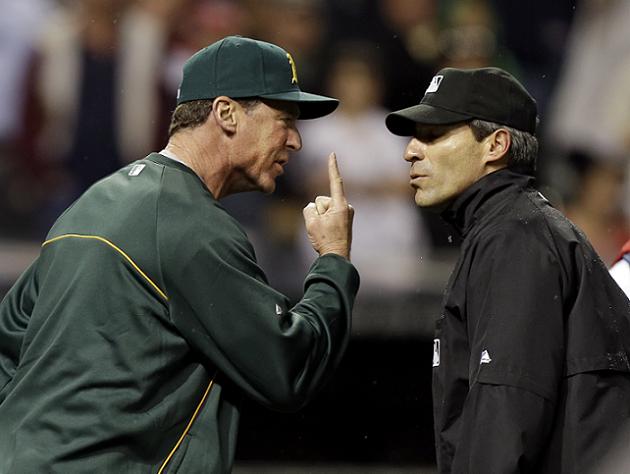Here we go again.
Even with the aid of instant replay, Angel Hernandez and his crew of umpires managed to botch the most important call in the A's-Indians game at Progressive Field on Wednesday night, which ultimately resulted in the Indians holding on to their precarious 4-3 lead for a stunning and controversial victory.
Here's what happened: Batting against Cleveland closer Chris Perez with two outs in the ninth inning, Adam Rosales launched what appeared to be a game-tying home run that bounced off the railing just beyond the high left field wall before caroming back onto the field. Admittedly, it was difficult to tell for sure at first look whether or not the ball cleared the wall. The umpires — playing it safe or just flat out missing what happened — ruled it to be in play which meant Rosales had to settle for a double. But it didn't seem like all that important a ruling with the inevitable review pending.
Boy would that change quickly.
Despite television replays leaving absolutely no doubt that the baseball struck the railing and changed direction on its way back to the field, the umpires stuck to their original ruling with the following reason being cited:
Angel Hernandez said no recorded interview, only write down answers but says they didn't have enough evidence to reverse call. #Athletics
— Susan Slusser (@susanslusser) May 9, 2013
That's a copout response from Angel Hernandez on several levels. If they saw the replay we were all privy to on television, there's no way he can stand behind that reasoning. None. The evidence wasn't just sufficient, it was overwhelming, which is why manager Bob Melvin blew a gasket and found himself in the dugout a few minutes early.
 Melvin was calmed down a bit by the time reporters got to him after to the game, but he still had some noteworthy comments courtesy of Slusser and the San Francisco Chronicle:
Melvin was calmed down a bit by the time reporters got to him after to the game, but he still had some noteworthy comments courtesy of Slusser and the San Francisco Chronicle:
“I went in and looked at it later, clearly, it hit the railing….I’m at a loss, I’m at a complete loss,” Melvin said.
Melvin said, “I’ve already called the league. What they said is that once I ask them and they agree to look at it, it’s a judgment call. It was bad judgment.
“I can’t process this yet. It’s too soon to take a step back. I’ve never felt so helpless on a baseball field. So helpless and so wronged.’’
“From the first it looked to me like it hit the railing. You could tell the way it ricocheted. If it hits the pad first, it comes off there softly. Clearly there was a ricochet. There’s no doubt it hit something solid.
“I don’t know how to handle something like this.’’
Unfortunately, there's no recourse for Melvin. The call will remain blown forever, and the Indians will remain the victors. It's frustrating, even from an outsider's view looking in. But I think the bigger story here is how much this highlights the reasons why replay, though mostly effective in getting calls correct, will never give us the clean game we desire. Yes, we all long for the day when Major League Baseball finally institutes a more comprehensive instant replay system, but this one botched review in Cleveland should remind us that it won't solve everything.
The human element will still exist, because human beings acting as umpires will handle the reviews. That means bad judgment and hesitation to overturn calls despite sufficient evidence at the most important part of a baseball game will also still exist, and as a result we'll continue to have outcomes determined by something that didn't actually happen.
Again, it's unfortunate, but at least now there's a chance a call can be corrected. Hopefully in the future there's a workable system that allows more plays to be reviewed. When it happens, we'll just have to live with those hits and the misses as well. Somehow.
Looking for more baseball chatter?
Follow @bigleaguestew, @Townie813, @AnswerDave and @MikeOz on Twitter
Also, check out the BLS Facebook Page
No comments:
Post a Comment